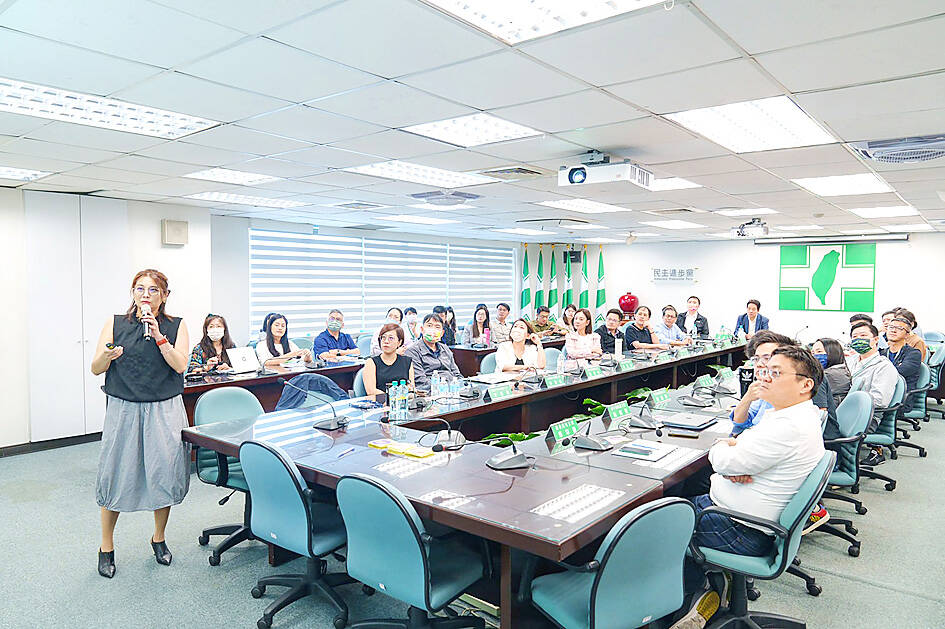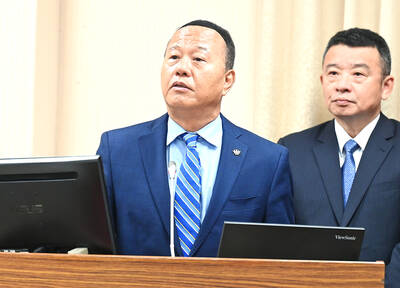The Executive Yuan yesterday said it plans to submit draft amendments to the Gender Equity Education Act (性別平等教育法), the Gender Equality in Employment Act (性別工作平等法) and the Sexual Harassment Prevention Act (性騷擾防治法) to the Legislative Yuan next month.
The proposed amendments come amid a wave of allegations of sexual misconduct against local political, media and social figures.
The Cabinet said that the amendments would focus on the definition of what constitutes sexual harassment and developing a better reporting mechanism.

Photo courtesy of DPP headquarters via CNA
The amendments would address employers’ responsibility regarding sexual misconduct, as current laws only provide guidance on preventing such incidents, Cabinet officials said.
Current laws stipulate that only companies with more than 30 employees are required to set up measures to prevent and report sexual misconduct in the workplace, leaving workers in small and medium-sized enterprises — the bulk of businesses in Taiwan — with no avenue to seek formal redress, the officials said.
The amendments would require more companies to establish their own formal reporting and punishment mechanisms, as well as shorten the period granted to address such complaints, the officials said.
Earlier this month, President Tsai Ing-wen (蔡英文) said she had tasked Premier Chen Chien-jen (陳建仁) with leading a government review of the issue.
Apologizing for the DPP’s mishandling of sexual misconduct complaints, Tsai said that sexual harassment was a problem in all facets of life and society.
The draft amendments would be sent to the Legislative Yuan around the middle of next month, Cabinet spokesperson Lin Tze-luen (林子倫) said.
Cabinet officials said the reforms would be based on consultations with experts and existing international laws such as the International Labour Organization’s Violence and Harassment Convention.

VIGILANCE: The military is paying close attention to actions that might damage peace and stability in the region, the deputy minister of national defense said The People’s Republic of China (PRC) might consider initiating a hack on Taiwanese networks on May 20, the day of the inauguration ceremony of president-elect William Lai (賴清德), sources familiar with cross-strait issues said. While US Secretary of State Anthony Blinken’s statement of the US expectation “that all sides will conduct themselves with restraint and prudence in the period ahead” would prevent military actions by China, Beijing could still try to sabotage Taiwan’s inauguration ceremony, the source said. China might gain access to the video screens outside of the Presidential Office Building and display embarrassing messages from Beijing, such as congratulating Lai

REPORT: Taipei has expressed an interest in obtaining loitering munitions matching the AeroVironment Switchblade 300 or the Anduril Altius-600, ‘Foreign Policy’ said Taiwan is seeking US-made kamikaze drones in an apparent concession to pressure from Washington to focus on asymmetric capabilities to defeat or deter a Chinese attack, Foreign Policy said in a report on Wednesday. Taipei has expressed an interest in obtaining AeroVironment Switchblade loitering munitions or other devices with similar capabilities, it said, citing four sources familiar with the matter commenting on condition of anonymity. The Switchblade 300 is a tube-launched drone designed for attacking ground troops, while its larger sibling, the Switchblade 600, could be used to destroy tanks and entrenched troops. Ukraine has utilized both systems extensively in its fight against

Police officers yesterday morning apprehended the prime suspect of a triple homicide case, after raiding the suspect’s hideout in Taichung. They transported the suspect to New Taipei City for questioning and recorded his statement last night. The suspect, identified as a 24-year-old man surnamed Chang (張), is believed to have used his hands to strangle his wife, surnamed Chen (陳), 29, along with his three-year-old son from a previous marriage and his wife’s mother, 69. The three dead bodies were wrapped in blankets when they were discovered inside their apartment in New Taipei City’s Sanchong District (三重) on Saturday. Chang was holding a

STRIKING A BALANCE: A nutritionist said that only 9 percent of respondents were concerned whether they had a sufficient balance of vegetables and fruits Nearly 60 percent of respondents said that they are affected physically and mentally due to lack of a regular breakfast routine, while only 9 percent ate a balanced diet, a Formosa Cancer Foundation survey showed. Thirty percent of respondents do not eat breakfast at home, saying it is more expedient to buy it, said Hsu Kuei-ting (徐桂婷), the foundation’s nutritionist, citing its most recent poll on nutritional intake for people aged 20 to 60. The poll showed that 60 percent believe they do not eat breakfasts that have balanced nutrition. At 62 percent, convenience was the most commonly cited factor in deciding whether